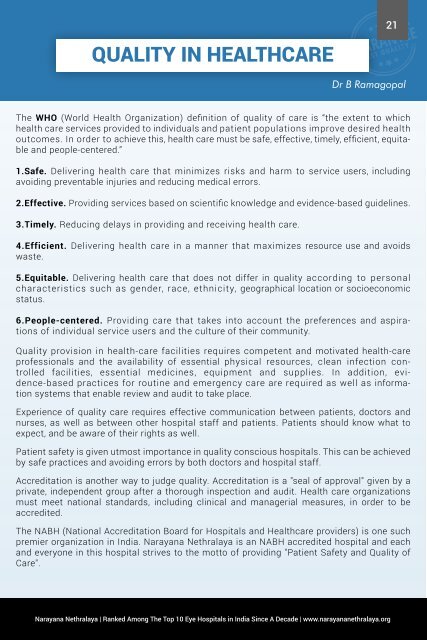Vision First English 2018
Create successful ePaper yourself
Turn your PDF publications into a flip-book with our unique Google optimized e-Paper software.
21<br />
QUALITY IN HEALTHCARE<br />
Dr B Ramagopal<br />
The WHO (World Health Organization) definition of quality of care is “the extent to which<br />
health care services provided to individuals and patient populations improve desired health<br />
outcomes. In order to achieve this, health care must be safe, effective, timely, efficient, equitable<br />
and people-centered.”<br />
1.Safe. Delivering health care that minimizes risks and harm to service users, including<br />
avoiding preventable injuries and reducing medical errors.<br />
2.Effective. Providing services based on scientific knowledge and evidence-based guidelines.<br />
3.Timely. Reducing delays in providing and receiving health care.<br />
4.Efficient. Delivering health care in a manner that maximizes resource use and avoids<br />
waste.<br />
5.Equitable. Delivering health care that does not differ in quality according to personal<br />
characteristics such as gender, race, ethnicity, geographical location or socioeconomic<br />
status.<br />
6.People-centered. Providing care that takes into account the preferences and aspirations<br />
of individual service users and the culture of their community.<br />
Quality provision in health-care facilities requires competent and motivated health-care<br />
professionals and the availability of essential physical resources, clean infection controlled<br />
facilities, essential medicines, equipment and supplies. In addition, evidence-based<br />
practices for routine and emergency care are required as well as information<br />
systems that enable review and audit to take place.<br />
Experience of quality care requires effective communication between patients, doctors and<br />
nurses, as well as between other hospital staff and patients. Patients should know what to<br />
expect, and be aware of their rights as well.<br />
Patient safety is given utmost importance in quality conscious hospitals. This can be achieved<br />
by safe practices and avoiding errors by both doctors and hospital staff.<br />
Accreditation is another way to judge quality. Accreditation is a "seal of approval" given by a<br />
private, independent group after a thorough inspection and audit. Health care organizations<br />
must meet national standards, including clinical and managerial measures, in order to be<br />
accredited.<br />
The NABH (National Accreditation Board for Hospitals and Healthcare providers) is one such<br />
premier organization in India. Narayana Nethralaya is an NABH accredited hospital and each<br />
and everyone in this hospital strives to the motto of providing "Patient Safety and Quality of<br />
Care".<br />
Narayana Nethralaya | Ranked Among The Top 10 Eye Hospitals in India Since A Decade | www.narayananethralaya.org

















